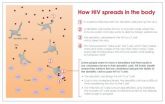(Press-News.org) PITTSBURGH, April 29, 2014 – People infected with HIV whose immune cells have low cholesterol levels experience much slower disease progression, even without medication, according to University of Pittsburgh Graduate School of Public Health research that could lead to new strategies to control infection.
The Pitt Public Health researchers found that low cholesterol in certain cells, which is likely an inherited trait, affects the ability of the body to transmit the virus to other cells. The discovery, funded by the National Institutes of Health (NIH), is featured in today's issue of mBio, the journal of the American Society for Microbiology.
When HIV enters the body, it is typically picked up by immune system cells called dendritic cells, which recognize foreign agents and transport the virus to lymph nodes where it is passed to other immune system cells, including T cells. HIV then uses T cells as its main site of replication. It is through this mechanism that levels of HIV increase and overwhelm the immune system, leading to AIDS. Once a person develops AIDS, the body can no longer fight infections and cancers. Prior to effective drug therapy, the person died within one to two years after the AIDS diagnosis.
"We've known for two decades that some people don't have the dramatic loss in their T cells and progression to AIDS that you'd expect without drug therapy," said lead author Giovanna Rappocciolo, Ph.D., an assistant professor at Pitt Public Health. "Instead the disease is much slower to progress, and we believe low cholesterol in dendritic cells may be a reason."
The discovery was made possible by using 30 years of data and biologic specimens collected through the Pitt Men's Study, a confidential research study of the natural history of HIV/AIDS, part of the national NIH-funded Multicenter AIDS Cohort Study (MACS).
"We couldn't have made this discovery without the MACS. Results like ours are the real pay-off of the past three decades of meticulous data and specimen collection," said senior author Charles Rinaldo, Ph.D., chairman of Pitt Public Health's Department of Infectious Diseases and Microbiology, and professor of pathology. "It is thanks to our dedicated volunteer participants that we are making such important advances in understanding HIV, and applying it to preventing and treating AIDS."
Medications called combination antiretroviral therapy (ART) disrupt the viral replication process and can delay the onset of AIDS by decades.
However, even without taking ART, a small percentage of people infected with HIV do not have the persistent loss of T cells and increase in levels of HIV after initial infection. They can sometimes go many years, even more than a decade, without the virus seriously compromising the immune system or leading to AIDS.
Through the Pitt Men's Study/MACS, eight such "nonprogressors" were assessed twice a year for an average of 11 years and compared to eight typically progressing HIV-positive counterparts.
Dr. Rappocciolo and her colleagues found that in nonprogressors, the dendritic cells were not transferring the virus to T cells at detectible levels. When taking a closer look at these dendritic cells, the researchers discovered that the cells had low levels of cholesterol, even though the nonprogressors had regular levels of cholesterol in their blood. A similar finding was shown for B lymphocytes, which also pass HIV to T cells, leading to high rates of HIV replication.
Cholesterol is an essential component of the outer membranes of cells. It is required for HIV to replicate efficiently in different types of cells. None of the study participants were taking statins, which are cholesterol-lowering medications that some people take to prevent vascular problems when cholesterol in their blood is too high.
When HIV was directly mixed with the nonprogressors' T cells in the laboratory, those T cells became infected with the virus at the same rate as the T cells of the regularly progressing, HIV-positive participants. Indeed, T cells from the nonprogressors had normal levels of cholesterol.
"This means that the disruption is unlikely to be due to a problem with the T cells, further supporting our conclusion that the slow progression is linked to low cholesterol in the dendritic cells and B cells," said Dr. Rappocciolo.
"What is most intriguing is that dendritic cells in the nonprogressors had this protective trait years before they became infected with HIV," Dr. Rinaldo said. "This strongly suggests that the inability of their dendritic cells and B cells to pass HIV to their T cells is a protective trait genetically inherited by a small percentage of people. Understanding how this works could be an important clue in developing new approaches to prevent progression of HIV infection."
INFORMATION:
Additional researchers on this study are Mariel Jais, B.S., Paolo Piazza, Ph.D., Todd A. Reinhart, Sc.D., Stella J. Berendam, B.S., Laura Garcia-Exposito, Ph.D., and Phalguni Gupta, Ph.D., all of Pitt Public Health.
This research was supported by NIH grants U01-AI35041 and R37-AI41870.
About the University of Pittsburgh Graduate School of Public Health
The University of Pittsburgh Graduate School of Public Health, founded in 1948 and now one of the top-ranked schools of public health in the United States, conducts research on public health and medical care that improves the lives of millions of people around the world. Pitt Public Health is a leader in devising new methods to prevent and treat cardiovascular diseases, HIV/AIDS, cancer and other important public health problems. For more information about Pitt Public Health, visit the school's Web site at http://www.publichealth.pitt.edu.
http://www.upmc.com/media
Contact: Allison Hydzik
Phone: 412-647-9975
E-mail: HydzikAM@upmc.edu
Contact: Wendy Zellner
Phone: 412-586-9771
E-mail: ZellnerWL@upmc.edu END
Low cholesterol in immune cells tied to slow progression of HIV
2014-04-29
ELSE PRESS RELEASES FROM THIS DATE:
Low cholesterol in immune cells slows HIV progression
2014-04-29
Scientists at the University of Pittsburgh have identified why some HIV-infected people experience much slower disease progression, even without medication, and it has to do with cholesterol levels in specific immune cells. They report their findings in mBio®, the online open-access journal of the American Society for Microbiology.
"A fascinating aspect of the AIDS epidemic is that a small percentage of HIV-1-infected persons, termed nonprogressors or controllers, maintain a relatively normal number of CD4 T cells (Th cells) and low viral load for many years without ...
When harm done can never be balanced: Vicarious revenge and the death of Osama bin Laden
2014-04-29
April 29, 2014 – Friday will mark the third anniversary of Osama bin Laden's assassination, a day when U.S. President Barack Obama famously stated "Justice has been done." But has it? A new study from a team of social psychology researchers led by Mario Gollwitzer of Philipps University of Marburg, has questioned whether this instance of vicarious revenge led to feelings of satisfaction and reestablished justice within the American public, including whether bin Laden's assassination ignited craving for more revenge.
Justice achieved
Vicarious revenge, where the need ...
Snobby staff can boost luxury retail sales
2014-04-29
When it comes to luxury brands, the ruder the sales staff the better the sales, according to new research from the University of British Columbia's Sauder School of Business.
The forthcoming Journal of Consumer Research study reveals that consumers who get the brush-off at a high-end retailer can become more willing to purchase and wear pricey togs.
"It appears that snobbiness might actually be a qualification worth considering for luxury brands like Louis Vuitton or Gucci," says Sauder Marketing Professor Darren Dahl. "Our research indicates they can end up having ...
NIH center sets new goals for global health research and training
2014-04-29
Global health research and training efforts should focus on combatting the growing epidemic of noncommunicable diseases, better incorporating information technology into research and training, and more effectively converting scientific discoveries into practice in low-resource settings, according to the Fogarty International Center's new strategic plan, released today. Fogarty is the component of the National Institutes of Health solely focused on supporting global health research and training, and coordinating international research partnerships across the agency.
As ...
Study of stem cell trials links discrepancies in data with reported success of treatment
2014-04-29
New research looking at the success of clinical trials of stem cell therapy shows that trials appear to be more successful in studies where there are more discrepancies in the trial data.
Researchers from Imperial College London conducted a meta-analysis of 49 randomised controlled trials of bone marrow stem cell therapy for heart disease. The study, published today in the British Medical Journal, identified and listed over 600 discrepancies within the trial reports.
Discrepancies were defined as two (or more) reported facts that could not both be accurate because ...
Annals of Internal Medicine tip sheet for April 29, 2014
2014-04-29
1. Viral hepatitis remains a major health concern in the U.S.
Experts comment on HHS 2014-2016 Viral Hepatitis Action Plan
Untreated chronic viral hepatitis affects between 3.5 and 5.3 million Americans and continues to fuel rising incidences of progressive liver disease, liver failure, and liver cancer. In 2011, the U.S. Department of Health and Human Services (HHS) unveiled the nation's first coordinated national approach to tackling viral hepatitis with the Action Plan for the Prevention, Care and Treatment of Viral Hepatitis in the United States. Priorities set ...
AAN issues findings on use of medical marijuana in treatment of certain brain diseases
2014-04-28
MINNEAPOLIS – A review by the American Academy of Neurology of available scientific research on the use of medical marijuana in brain diseases finds certain forms of medical marijuana can help treat some symptoms of multiple sclerosis (MS), but do not appear to be helpful in treating drug-induced (levodopa) movements in Parkinson's disease. Not enough evidence was found to show if medical marijuana is helpful in treating motor problems in Huntington's disease, tics in Tourette syndrome, cervical dystonia and seizures in epilepsy. The review is published in the April 29, ...
Surveys indicate decline in children's exposure to violence
2014-04-28
Children's exposure to violence and crime declined between 2003 and 2011.
Rates of violent crime have declined in the United States since the 1990s. The authors previously completed three national telephone surveys of children and caregivers on children's exposure to violence in 2003, 2008 and 2011.
In this study, the authors analyzed the surveys for changes over time from 2003 to 2011.
The authors examined 50 specific trends in exposures to violence and crime and found 27 significant declines and no significant increases between 2003 and 2011. There were declines ...
High doses of antidepressants appear to increase risk of self-harm in children young adult
2014-04-28
Bottom Line: Children and young adults who start antidepressant therapy at high doses, rather than the "modal" [average or typical] prescribed doses, appear to be at greater risk for suicidal behavior during the first 90 days of treatment.
Author: Matthew Miller, M.D., Sc.D., of the Harvard School of Public Health, Boston, and colleagues.
Background: A previous meta-analysis by the U.S. Food and Drug Administration (FDA) of antidepressant trials suggested that children who received antidepressants had twice the rate of suicidal ideation and behavior than children who ...
Simply being called 'fat' makes young girls more likely to become obese
2014-04-28
Girls who are told by a parent, sibling, friend, classmate or teacher that they are too fat at age 10 are more likely to be obese at age 19, a new study by UCLA psychologists shows.
The study looked at 1,213 African-American girls and 1,166 white girls living in Northern California, Cincinnati and Washington, D.C., 58 percent of whom had been told they were too fat at age 10. All the girls had their height and weight measured at the beginning of the study and again after nine years.
Overall, the girls labeled fat were 1.66 times more likely than the other girls to be ...


